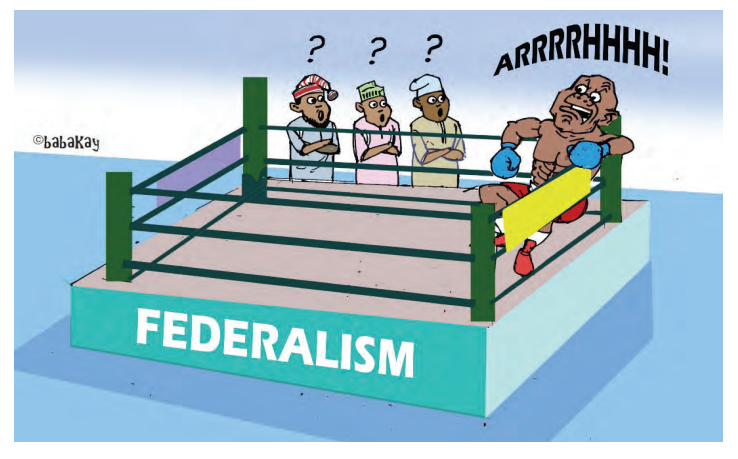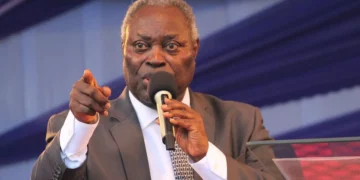In the sweet science of boxing, the quality of the boxer’s corner is virtually as important as the pugilist’s skill itself. There are tricks that the trainer and the cut-man know that could swing the fight one way or the other — a word of caution here on how to better handle the opponent, expert management of cuts to staunch bleeding or swelling there… In the roped square where there is no hiding place, a boxer’s fate is inextricably tied to the quality of his corner.
One of the classic instances of a trainer saving his ward from possible disgrace was when Angelo Dundee widened an existing small split in one of Muhammad Ali’s gloves after Henry Cooper had knocked him down in the closing seconds of the fourth round in their 1963 fight. In the process of fitting Ali with another glove, the boxer regained his full composure and was able to resume the fight with added gusto. But I digress.
Nigeria has been fighting the battle of survival in the ring of life since the country was cobbled together. Sometimes it seems all will be well; at other times it is clear that external assistance may be needed. But in the ring of life, God help that pugilist whose cornermen are atavistic belligerents quarrelling during the break between rounds instead of inspiring their boxer to go out roaring like a lion.
Say what you will, there are worse eventualities that could befall a person than being born in Nigeria. However, in this ring of life, it has been Nigeria’s lot to have in its corner, people fighting their own personal battles with invisible demons and leaving Nigeria to its own devices. Each time you need somebody to show up for Nigeria among the statutory cornermen, one showboater in need of minders shows up. Now who is minding who?
Ordinarily, Senator Ali Ndume, given his long years in the senate, could be counted among the cornermen in Nigeria’s ring of life. When the waters seem rough, people like Ndume ought to be moderating forces to ensure a smooth sail. But, as we have seen recently, the senator thinks his position is that of a tribal champion.
Ndume was unhappy with the decision to relocate the headquarters of the Federal Airports’ Authority of Nigeria (FAAN) to Lagos, four years after the former administration relocated all the aviation agencies to Abuja.
Aviation workers had reacted positively to the development. The Nigeria Aviation Fire and Safety Association (NAFSA) said it was the best decision that would enhance productivity and boost operational efficiency. It noted that, “Lagos, aside from being the commercial nerve centre, is the hub of the aviation business in Nigeria”.
The Air Transport Service Senior Staff Association of Nigeria (ATSSSAN), the National Union of Air Transport Employees (NUATE), and the Association of Nigerian Aviation Professionals (ANAP) also commended the move. In a joint bulletin, the groups said the initial relocation of FAAN headquarters to Abuja was hurried and improperly done. “Senior staff were left stranded without office and working tools while junior staff were helpless, with no provision for documents and working files and most worrisome, absence of backup for data.” They urged the government to ensure that the current directive is properly executed for staff welfare and ease of service delivery.
Another case of relocation which Senator Ndume reads as a conspiracy to return the country’s capital to Lagos is the directive of the CBN for the relocation of some departments to Lagos for administrative convenience. The departments penciled down for relocation by the CBN Governor, Yemi Cardoso, are Banking Supervision; Other Financial Institutions Supervision; Consumer Protection Department; Payment System Management Department and Financial Policy Regulations Department. It was explained that the directive was given because most of the banks’ headquarters are in Lagos and the CBN has a sprawling edifice in the city which is lying fallow while the Abuja headquarters is congested.
Ndume interprets this as an attempt to return the capital to Lagos, against the interests of “the North”. He warned that the relocation of the CBN offices and the headquarters of FAAN from Abuja to Lagos will brew political crisis. He ignores the fact that Abuja is constitutionally stated as Nigeria’s capital and that there are other federal agencies, such as the National Inland Waterways Authority (NIWA) headquartered outside Abuja
He thinks the relocation is the idea of some “Lagos boys” around President Tinubu: “Some of them think that they know better than everybody. But, they don’t know anything. When you don’t know Nigeria, you only know Lagos, then you start doing things as if Nigeria is Lagos…”
The senator has threatened that there will be political consequences of relocating any department to Lagos. Analysts are not in any doubt as to what he meant. The president is being warned that the North is a monolithic voting bloc capable of torpedoing his electoral canoe in 2027 (hear, hear)! That sounds like the argument of people who have an entitlement mentality, not allies in nation building.
Ndume is not the only one to have faulted the relocation. The Arewa Consultative Forum, a socio-political group in northern Nigeria, also argued that the CBN’s decision showed a disturbing pattern of antagonistic actions often taken by certain Federal Government agencies “against the interests of the North and other parts of the country”, noting that northerners will be negatively affected by the spontaneous exercise.
ACF also accentuated the ethnic angle: “ACF wishes to remind all concerned that decades ago, the seat of the capital of the Federal Republic was moved from Lagos to Abuja for reasons that remain valid, it is constitutional even more so today, constitutionally so, although, of course, a section of the country never liked the decision.”
Several other notable individuals and groups also spoke for or against the planned departmental relocation. A body which described itself as the Arewa Consultative Youth and Women Forum (ACYWF) distanced itself from the criticism and protest over the relocation.
However, the most authoritative voice in terms of empirical knowledge of the subject matter, came from the former governor of the central bank, Alhaji Sanusi Lamido Sanusi, who stood above the fray: According to Sanusi, “Moving certain functions (of the CBN) to the Lagos office (which is bigger than the Abuja head office) is an eminently sensible move… In my mind what I would have done was to move FSS and most of Operations to Lagos such that the two Deputy Governors would be largely operating out of Lagos or, even if they were more in Abuja, the bulk of their operational staff would be in Lagos… Economic policy, corporate services and all the departments reporting to the Governor directly such as Strategy, Audit, Risk management, Governors’ office, etc would remain in Abuja.”
Sanusi continued: “Moving staff to the Lagos office to streamline operations and make them more effective and reduce cost is a normal prerogative of management. The question of locating functions is a strategic and not a tactical one. A proper analysis should be done to identify which roles are best suited to Lagos and which to Abuja. Once the logic is clear, the people then follow. Non-communication of strategic intent opens the door to mischievous misrepresentation and arbitrariness.”
He recalled that he faced the same kind of opposition when he was the CBN governor: “When I was about to license Jaiz Bank there was a lot of religious noise from the Christian Association of Nigeria and some other organisations…” Another insider, Mohammed A. Yakasai, a retired Director of the CBN, testified to the truth of Sanusi’s disclosures.
My question: In this boxing ring of federalism, who is going to man Nigeria’s corner, not just a tribe’s or region’s? My sadness is that some politicians are orphaning Nigeria, making the country cut the picture of a scantily clad urchin shivering in the early morning harmattan wind, its sunken eyes betraying hunger, even anaemia. Its ‘minders’? They’re busy struggling for turf while the orphan wastes away.











